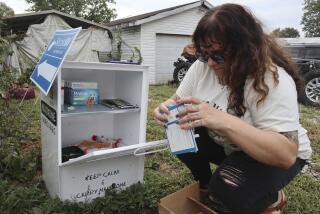Group Ships Surplus Drugs to Needy
- Share via
They use cardboard to bind broken limbs, thread instead of sutures to mend wounds. They operate without antibiotics or pain relievers and even wash bloody gauze so it can be used again.
In hospitals, clinics and makeshift treatment centers around the world, doctors and foreign missionaries struggle daily with a scarcity of medicines and supplies.
But medicines and equipment worth millions of dollars sit idle on the shelves of hospitals, doctors’ offices and medical supply warehouses--destined to be discarded as they reach expiration dates or are replaced with newer versions.
Enter CrossLink International. Operating from a Falls Church, Va., warehouse it shares with a plumbing company, the tiny nonprofit group is putting some of those stocks to use, sending surplus drugs and medical supplies to dozens of needy countries and to free clinics in the area. But while the group has distributed more than $15 million worth of goods in the last four years, it says supplies valued at many times that figure routinely go unused.
“We’re trying to get the word out that we’re available to link these valuable resources with people who don’t have anything,” said David Rogers, director of Cross-Link.
CrossLink is preparing to ship a 40-foot container of medical supplies and used eyeglasses to Honduras early in September. A team from Arlington Hospital, including about 25 doctors, is scheduled to fly to the Central American country in late October to perform operations at a hospital and offer primary care to indigent patients at five village clinics.
At the warehouse, CrossLink volunteers sort donated pharmaceuticals ranging from common pain relievers and prenatal vitamins to expensive new pills to eradicate tapeworms. The group rejects expired medicines, does not accept narcotics and normally requires that the drugs it ships abroad carry expiration dates at least six months away.
CrossLink must observe these dates to maintain its state license as a warehouser and distributor of proprietary medicines, said Linda Cook, the group’s project director. That license allows CrossLink to buy drugs at wholesale rates.
Many of the donated drugs come from free “pharmaceutical samples” that major companies give to doctors, Cook said. “A lot of hospice families also donate to us,” she said. These families sometimes send unopened medicines after their loved ones die, but more often provide equipment such as walkers, wheelchairs, crutches and portable toilets.
Elsewhere in the warehouse, volunteers stack cartons of supplies, including hospital sheets, syringes and examination gloves, on pallets. In recent months, CrossLink has shipped cribs and hospital beds to Romania and Tanzania, orthopedic equipment to Turkey and materials for making casts to Haiti. In the works, Rogers said, are shipments of medicines, supplies and nutritional items to Ethiopia and, for the first time, North Korea.
With a staff of three and an annual budget of just $250,000, Cross-Link tries to keep its overhead low, relying on about 100 volunteers and partnerships with hospitals, doctors, retirement homes, civic groups and churches, Rogers said. Since it was set up as a nonprofit in 1996, it has sent goods to 70 countries and seven free clinics in northern Virginia.
“We’re always looking for more volunteers,” said Rogers, 52. “We’re also trying to build awareness among the medical community.”
One of CrossLink’s leading partners is Lions Clubs International, which collects used eyeglasses for distribution to the world’s poor. In the basement of the warehouse, Lions Club volunteers wash glasses, check their prescriptions on a lens-reading machine and sort and pack them for shipment by CrossLink.
“In the two years since we started here, we’ve shipped 65,100 pairs,” said Clark Erickson, 59, past governor of Lions Clubs International’s Northern Virginia district.
The organization estimates that one-tenth of the world’s population-- about 600 million people--needs glasses but cannot afford them, Erickson said. But all participating U.S. Lions Clubs combined collect about 500,000 pairs a year. “We would make a huge dent if people would just clean out their drawers,” Rogers said.
More to Read
Sign up for Essential California
The most important California stories and recommendations in your inbox every morning.
You may occasionally receive promotional content from the Los Angeles Times.













